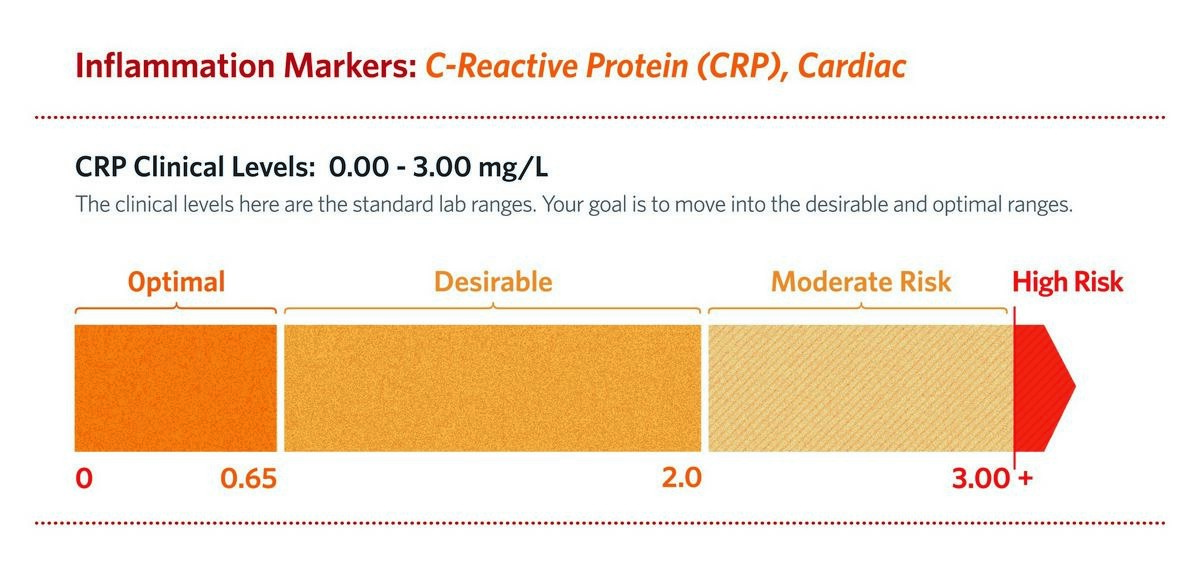
Contents
- 1 C-Reactive Protein (CRP) Test
- 1.0.1 What does it mean to have elevated C-reactive protein levels?
- 1.0.2 What are the normal and elevated ranges for C-reactive protein?
- 1.0.3 How are normal and elevated C-reactive protein levels measured?
- 1.0.4 When should you have C-reactive protein blood levels tested?
- 1.0.5 What is the treatment for elevated C-reactive protein blood levels?
- 1.0.6 How can you lower your C-reactive protein blood levels?
- 1.0.7 How can low, moderate, and elevated C-reactive protein values predict potential heart disease?
- 1.0.8 Are elevated C-reactive protein levels a risk factor for heart disease?
- 1.0.9 Is there a link between C-reactive protein and heart attack and stroke risk?
- 1.0.10 From
C-Reactive Protein (CRP) Test
There are no specific signs or symptoms for an elevated C-reactive protein level because it is not a specific test. Signs or symptoms, if present, would depend on the underlying inflammatory condition that is the cause of the elevated CRP level.
What does it mean to have elevated C-reactive protein levels?
The main causes of increased CRP and other markers of inflammation are a variety of conditions, including
- burns,
- trauma ,
- infections like pneumonia or tuberculosis,
- heart attack,
- chronic inflammatory diseases like lupus, vasculitis, or rheumatoid arthritis,
- inflammatory bowel disease, and
- certain cancers.
What are the normal and elevated ranges for C-reactive protein?
C-reactive protein is a marker of inflammation and is typically not detected in the blood unless there is inflammation present in the body.
How are normal and elevated C-reactive protein levels measured?
C-reactive protein is measured using a blood sample from a vein, which is then taken to a laboratory for analysis.
- The traditional CRP measurement is used to detect inflammation in the body. Your health-care provider may order a C-reactive protein level to check for flare-ups of inflammatory diseases like rheumatoid arthritis, lupus, or vasculitis, or to monitor the effectiveness of anti-inflammatory medications.
- Currently, a more sensitive measurement, called hs-CRP, is used for cardiovascular risk assessment.
- Due to potential influences from infections or inflammations, a one-time measurement is not sufficient for cardiovascular risk assessment. The U.S. Centers for Disease Control and Prevention (CDC) recommends checking two separate CRP levels approximately two weeks apart and using the average of the two readings for cardiovascular risk assessment and screening purposes.
When should you have C-reactive protein blood levels tested?
Checking the CRP level for the entire adult population is not recommended. Some experts suggest checking the serum CRP level routinely along with the cholesterol level, although this is not widely accepted. Ideally, for cardiac risk testing, it is advisable to use the average between two separate CRP levels drawn two weeks apart.
The CRP level can provide additional information about an individual’s cardiovascular risk when considered alongside other known cardiac risk factors like
- diabetes mellitus,
- high blood pressure,
- high cholesterol,
- obesity,
- age, and
- smoking cigarettes.
What is the treatment for elevated C-reactive protein blood levels?
The treatment of an elevated CRP in the context of cardiovascular disease may be meaningless. Instead, appropriate treatment and prevention of the underlying risks and conditions should be the primary focus of cardiovascular risk reduction.
The most effective ways to reduce cardiac risk factors are
- regular exercise,
- a balanced diet,
- cigarette smoking cessation.
In individuals with elevated cholesterol levels who do not reach their target cholesterol level with
- diet modifications,
- exercise,
- cholesterol-lowering medication.
People with elevated CRP levels may be advised by their doctors to use statin drugs, such as simvastatin [Zocor], atorvastatin [Lipitor], etc. These drugs are recommended for lowering cholesterol and can also lower CRP levels.
Aspirin therapy and some diabetic medications have also been shown to reduce CRP levels.
How can you lower your C-reactive protein blood levels?
The overall outlook for those with an elevated CRP largely depends on the cause. In general, the level may be elevated as a response to any inflammation or infection present in the body. Success of treatment directed at the underlying cause will determine the outlook.
As a risk assessment tool for cardiovascular disease, the elevation of CRP correlates with the presence of traditional cardiac risk factors including
- hypertension (high blood pressure),
- high cholesterol,
- diabetes mellitus,
- obesity,
- advanced age,
- cigarette smoking, and
- strong family history of cardiac disease.
- Appropriate medical management of these risk factors includes
- diet,
- exercise,
- smoking cessation.
Medical treatment and management of the risk factors for elevated C-reactive protein blood levels are important to prevent future cardiovascular disease.
How can low, moderate, and elevated C-reactive protein values predict potential heart disease?
According to the American Heart Association (AHA) and the CDC, the following guidelines are recommended for the assessment of cardiovascular risk in regards to high-sensitivity C-reactive protein (hs-CRP) levels:
- Low risk for cardiovascular disease if hs-CRP is 1 milligram (mg) per liter or less
- Moderate risk for cardiovascular disease if hs-CRP is between 1 and 3 mg per liter
- High risk for cardiovascular disease if hs-CRP greater than 3 mg per liter
CRP level of greater than 10 mg per liter may be seen in an acute plaque rupture like a heart attack or stroke, provided there is no other explanation for the elevated level.
| Risk | hs-CRP Level |
| Low risk | 1 milligram (mg) per liter or less |
| Moderate risk | between 1 and 3 mg per liter |
| High risk | greater than 3 mg per liter |
| Acute plaque rupture (a stroke or heart attack) | greater than 10 mg per liter |
Are elevated C-reactive protein levels a risk factor for heart disease?
Due to the inflammatory component of atherosclerosis, it may correlate with an elevated CRP level and has been linked with cardiovascular disease. However, it cannot be considered an independent risk factor for cardiovascular disease based on currently available data.
Elevated CRP levels alone are unlikely to be a cause of cardiovascular disease after considering traditional risk factors.
Nevertheless, CRP may be used as a predictor of cardiovascular disease based on its correlation with other known cardiac risk factors and their role in the formation of atherosclerosis. Elevated CRP levels have been detected in individuals with some or all of these traditional risk factors, and there may be a trend of higher CRP elevation with a higher number of risk factors.
By clicking "Submit," I agree to the MedicineNet Terms and Conditions and Privacy Policy. I also agree to receive emails from MedicineNet and I understand that I may opt out of MedicineNet subscriptions at any time.
Is there a link between C-reactive protein and heart attack and stroke risk?
The elevation of CRP has also been linked to atherosclerosis and heart disease. Atherosclerosis, or cholesterol plaquing of the arteries, has an inflammatory component that is thought to cause the rise in CRP levels in the blood. Atherosclerosis is affected by age and other cardiovascular risk factors including diabetes mellitus, high cholesterol, high blood pressure, and cigarette smoking.
In atherosclerosis, the blood vessel wall becomes injured, leading to inflammation and the formation of plaques. The plaques contain blood cells of inflammation, cholesterol deposits, and debris from the injured cells in the blood vessel lining. These elements narrow the blood vessels, leading to hindered blood flow and potential blockage, resulting in strokes and heart attacks.
The burden of plaques in the body can be proportional to the degree of CRP elevation in persons with atherosclerosis. Atherosclerotic plaques can exist in different stages throughout the body.
From
Healthy Heart Resources
- Signs Psoriasis May Be Affecting Your Heart
- Diagnosing Hypertrophic Cardiomyopathy
- Exercising With HCM: How to Sweat Safely


